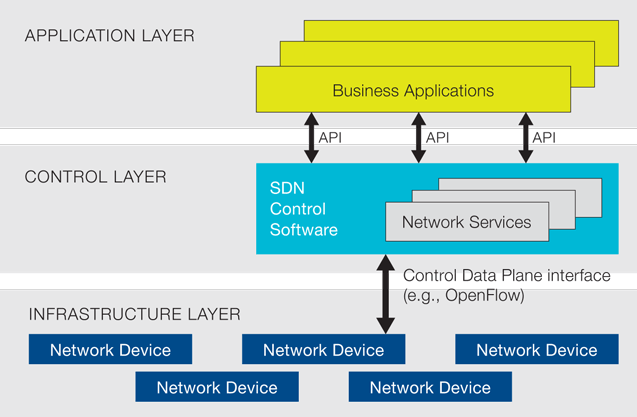Five Standards That Could Change the Future
Software-defined networking (SDN)
Make no mistake: software-defined networking (SDN) is the future of networking. How that future is defined, though, is still up in the air.
SDN offers great promise to network operators because it separates the data plane from the control plane, eliminating the need for manual configuration of network nodes. In other words, network services no longer have to be coupled with specific hardware elements, and implementing a change to the flow of network traffic no longer requires a truck roll and an engineer to perform a hardware modification.

Source: Open Networking Foundation
There are at least six flavors of SDN, all of which offer the following benefits:
- increased agility and greatly enhanced service management;
- facilitation of the deployment of new services;
- reduction in the cost of network management;
- enablement of seamless networking across multivendor environments.
The leading champion of SDN is the Open Networking Foundation, which advocates the OpenFlow standard. Iterations are already in production environments like Deutsche Telekom’s TeraStream project, which was profiled in Pipeline in May. Verizon, Telefónica, BT, and Google have implemented SDN in a limited capacity, and AT&T offers it as part of its enterprise-services portfolio. But for SDN to become standardized around the world, vendors must support interoperability, which seems unlikely, at least in the near term.
Currently, each vendor implements SDN slightly differently using a combination of OpenFlow and proprietary standards, creating “islands of SDN.” CSPs will presumably continue to implement it in small pilots—data centers, video services, etc.—until the business case for the full-scale transition to SDN overwhelms objections.
Standards mean business
Whether you are talking about LTE-A, V2X, Isis, joyn, or SDN, one common theme runs through each of them — these acronyms mean business. They are the standards that are going to be the
fundamental building blocks for growth in communications and entertainment services in the very near future. They provides CSPs with an opportunity to deliver the speeds, networks, payments, and
rich communications services of tomorrow and they are here today.


















